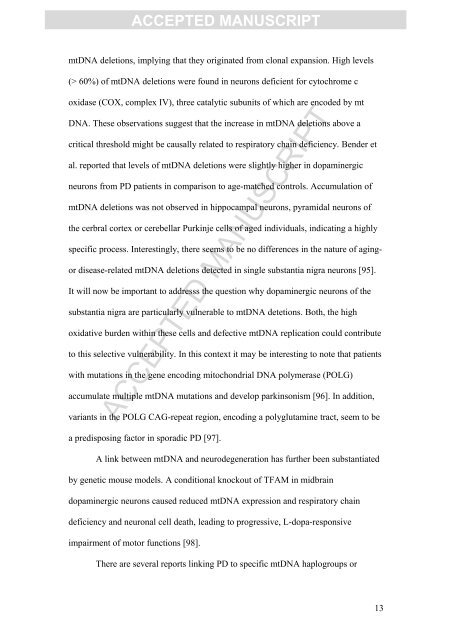accepted manuscript
accepted manuscript
accepted manuscript
You also want an ePaper? Increase the reach of your titles
YUMPU automatically turns print PDFs into web optimized ePapers that Google loves.
ACCEPTED MANUSCRIPT<br />
mtDNA deletions, implying that they originated from clonal expansion. High levels<br />
(> 60%) of mtDNA deletions were found in neurons deficient for cytochrome c<br />
oxidase (COX, complex IV), three catalytic subunits of which are encoded by mt<br />
DNA. These observations suggest that the increase in mtDNA deletions above a<br />
critical threshold might be causally related to respiratory chain deficiency. Bender et<br />
al. reported that levels of mtDNA deletions were slightly higher in dopaminergic<br />
neurons from PD patients in comparison to age-matched controls. Accumulation of<br />
mtDNA deletions was not observed in hippocampal neurons, pyramidal neurons of<br />
the cerbral cortex or cerebellar Purkinje cells of aged individuals, indicating a highly<br />
specific process. Interestingly, there seems to be no differences in the nature of aging-<br />
or disease-related mtDNA deletions detected in single substantia nigra neurons [95].<br />
It will now be important to addresss the question why dopaminergic neurons of the<br />
substantia nigra are particularly vulnerable to mtDNA detetions. Both, the high<br />
oxidative burden within these cells and defective mtDNA replication could contribute<br />
to this selective vulnerability. In this context it may be interesting to note that patients<br />
with mutations in the gene encoding mitochondrial DNA polymerase (POLG)<br />
accumulate multiple mtDNA mutations and develop parkinsonism [96]. In addition,<br />
ACCEPTED MANUSCRIPT<br />
variants in the POLG CAG-repeat region, encoding a polyglutamine tract, seem to be<br />
a predisposing factor in sporadic PD [97].<br />
A link between mtDNA and neurodegeneration has further been substantiated<br />
by genetic mouse models. A conditional knockout of TFAM in midbrain<br />
dopaminergic neurons caused reduced mtDNA expression and respiratory chain<br />
deficiency and neuronal cell death, leading to progressive, L-dopa-responsive<br />
impairment of motor functions [98].<br />
There are several reports linking PD to specific mtDNA haplogroups or<br />
13
















